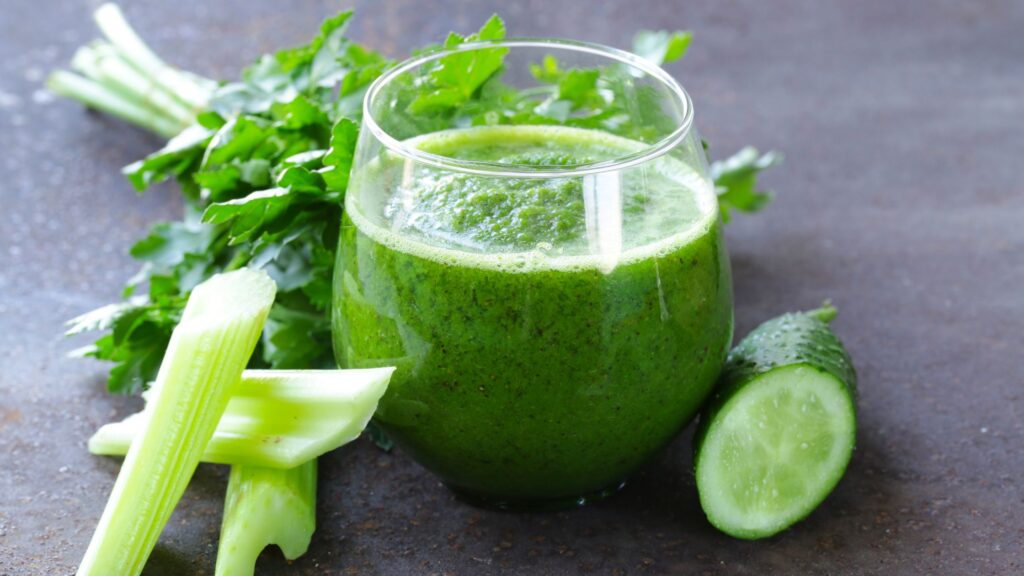#1: Quick and Easy Digestion
Many people struggle with slow digestion at least once in their lives. According to Web MD, nearly 40% of older adults have one or more age-related digestive symptoms each year.
Indigestion is caused by various factors, including medications, inactivity, dehydration, and even just plain old aging.
As we get older, so do our colons, digestion tract, and even the processes of our digestive systems, making digestion a more tedious process than it was in our youth.
Juicing helps your body because it hardly requires any digestion. When you juice, you use more fresh fruits and vegetables than you could actually eat. And all the dense nutrients – vitamins, minerals, and plant-based nutrients – are jam-packed in the juice and able to enter your system rapidly, easing any digestive problems you may have.
#2. Natural Boost of Energy
Fresh juices give you a natural boost of energy, and unlike coffee or energy drinks, they don’t result in a crash. They deliver high concentrations of nutrients to your body, which keeps your body active and alert all day long.
#3: Anti-Aging
One of the primary causes of aging is oxidation. Our bodies come into contact with free radicals from our environment (cigarette smoke, pollution, radiation) and from our bodies’ own metabolic processes.
Vitamin C. Health benefits of vitamin C are antioxidant, anti-atherogenic, anti-carcinogenic, and immunomodulator. The positive effect of vitamin C resides in reducing the incidence of stomach cancer, and in preventing lung and colorectal cancer. Vitamin C works synergistically with vitamin E to quench free radicals and also regenerates the reduced form of vitamin E. Natural sources of vitamin C are acid fruits, green vegetables, and tomatoes. Ascorbic acid is a labile molecule, therefore it may be lost during cooking.
Lycopene. Lycopene, a carotenoid, possesses antioxidant and antiproliferative properties . Several prospective cohort studies have found associations between a high intake of lycopene and reduced incidence of prostate cancer, though not all studies have produced consistent results. The major dietary source of lycopene is tomatoes, with the lycopene in cooked tomatoes, tomato juice, and tomato sauce included, being more bioavailable than that in raw tomatoes.
Selenium (Se). Se is a trace mineral found in soil, water, vegetables (garlic, onion, grains, nuts, soybean), seafood, meat, liver, and yeast. Se is an antioxidant, anti-carcinogenic, and immunomodulator. Selenium is also necessary for thyroid function. Selenium deficiency can occur in patients on total parenteral nutrition (TPN) and in patients with gastrointestinal disorders. The role of Se in cancer prevention has been the subject of recent studies and debate. Results from clinical and cohort studies about cancer prevention, especially lung, colorectal, and prostate cancers are mixed.
Flavonoids. Flavonoids are polyphenolic compounds that are present in most plants. The beneficial effects of flavonoids on human health mainly reside in their potent antioxidant activity. They have been reported to prevent or delay a number of chronic and degenerative ailments such as cancer, cardiovascular diseases, arthritis, aging, cataract, memory loss, stroke, Alzheimer’s disease, inflammation, and infection. Every plant contains a unique combination of flavonoids, which is why different herbs, all rich in these substances, have very different effects on the body. The main natural sources of flavonoids include green tea, grapes (red wine), apple, cocoa (chocolate), ginkgo biloba, soybean, curcuma, berries, onion, broccoli, etc.
#4: Improves Heart Health
Juicing is a great source of antioxidants such as vitamins C and E – both of which prevent the damaging effect of free radicals in your body, especially from damaging your artery walls.
These antioxidants prevent your blood from sticking, clotting, or becoming toxic while simultaneously lowering triglyceride levels. Triglycerides are the most common type of fat in the body and are linked with heart disease, diabetes, and the buildup of fatty deposits in artery walls.
Fresh juices also contain a variety of other nutrients – such as potassium and magnesium – which are crucial for proper heart function.
#5: Detoxifies the Liver
One of the liver’s most crucial functions is cleansing your blood by removing toxins and metabolic wastes.
Fresh juices full of nutrients such as antioxidants and other vitamins are incredibly helpful for the liver.
#6: Cuts Down on Overeating
Many people overeat when their blood sugar drops. When their blood sugar drops unexpectedly, many people turn to carb-heavy food.
Juicing can help prevent overeating by stabilizing your blood sugar levels. The dense nutrients found in fresh juices can keep your blood sugar steady throughout the day and prevent you from overeating.
#7: Healthy Skin, Hair, and Nails
The biggest cause of premature aging – i.e. wrinkles – is caused by damage from our environment, such as damage from sun exposure.
Antioxidants are immensely helpful in helping our skin combat damage from free radicals, such as those caused by UV exposure.
A lack of vitamin A in our system is also responsible for a host of beauty problems, such as acne, dry skin, dry and coarse hair, and even dandruff.
Carotenoids, which are found in most fruits and vegetables, promote skin smoothness and combat skin problems by acting as a precursor to vitamin A (our bodies convert beta-carotene to vitamin A only to the degree that we need it) which strengthens our skin, hair, and nails. Carotenoids are found in most fruits and vegetables.
#8: Boost Your Immune System
Our immune system is a complex process that is constantly working hard to remove foreign pathogens from our bloodstream and tissues.
Registered dietitian Julia Zumpano, RD, LD, states “You build a strong immune system by maintaining healthy eating habits over time. The more you regularly choose a vitamin-rich diet, the more likely you are to strengthen your immune system for the long haul.”
Zumpano shares which vitamins you need to give your immune system a boost and how to get them.
Vitamin C
Vitamin C is one of the biggest immune system boosters of all. In fact, researchers say vitamin C deficiency can make you more prone to getting sick. Vitamin C acts as an antioxidant, meaning it can protect your body from toxins that cause inflammation in your body.
Getting your intake of vitamin C on a regular basis is essential for good health because your body doesn’t produce it on its own. It also doesn’t store it to use later. The good news is that vitamin C is in so many foods that most people don’t need to take a vitamin C supplement unless a doctor advises it.
Vitamin C-rich foods
Vitamin C is most commonly associated with orange citrus fruits, but you can get your fill of vitamin C from a variety of fruits and vegetables which are great for juicing (ranked from highest levels of Vitamin C to lower levels):
- Oranges and orange juice.
- Grapefruit
- Kiwi.
- Strawberries.
Vitamin E
Vitamin E is a powerful antioxidant that helps your body fight off infection. Researchers say vitamin E is one of the most effective nutrients for your immune function. That’s because it helps keep your T-cells working at peak performance.
Get your fill of vitamin E
Zumpano says to avoid taking vitamin E supplements. Not only is there little clinical research showing that vitamin E supplements benefit your health, but they may also be harmful in some situations.
Instead, load up with these vitamin E-filled foods. The higher on this list, the more vitamin E they contain:
- Spinach.
- Kiwi.
- Mango.
- Tomatoes.
Zinc
Zinc is an anti-inflammatory and antioxidant. Researchers call it the “gatekeeper” of your immune system because it’s responsible for making all your immune cells function properly.




